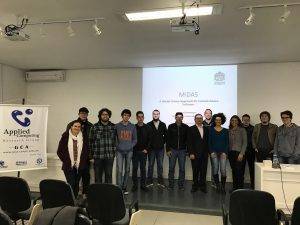 Our research group had a pleasure to receive Sr. José Joaquim Bocanegra García, a PhD student from the Pontificia Universidad Javeriana (Colombia). During his research visit he provided a seminar for the group on MiDAS, a model-driven approach for context-aware software.
Our research group had a pleasure to receive Sr. José Joaquim Bocanegra García, a PhD student from the Pontificia Universidad Javeriana (Colombia). During his research visit he provided a seminar for the group on MiDAS, a model-driven approach for context-aware software.
Talk summary: Context-aware software uses context to provide relevant information and/or services to the user. Although context-aware software has an increasing importance, this area is still immature in terms of tools, languages, and methods. Therefore, context-aware software presents several opportunities and challenges for software engineers, and new models and theories are needed to address these challenges. Some of the main problems in software engineering for adaptive software are the lack of mechanisms for abstracting and formalizing the concepts related to adaptation in the requirements and design specifications directly, and the difficulty to translate requirements and design specifications to a concrete implementation. To address the above problems, our research project proposes MiDAS, a framework that uses a model-driven approach to develop adaptive software. Specifically, MiDAS provides: (i) a context-aware requirements specification language (c-RSL); (ii) a context-aware design specification language (c-DSL); (iii) a model-to-model transformation to derive design models from requirements models; (iv) a model-to-text transformation to derive a platform independent model (PIM) from design models; and (v) a model-to-text transformation to derive a context-aware software for a specific platform, taking as input the PIM.
